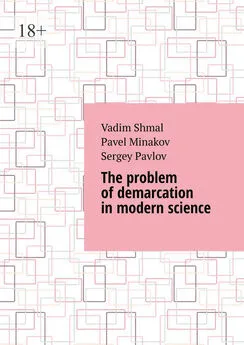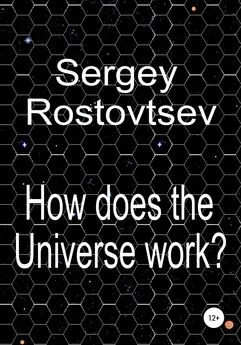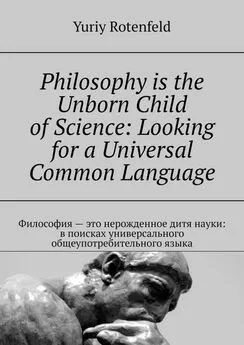Sergey Pavlov - The problem of demarcation in modern science
- Название:The problem of demarcation in modern science
- Автор:
- Жанр:
- Издательство:неизвестно
- Год:неизвестен
- ISBN:9785005532459
- Рейтинг:
- Избранное:Добавить в избранное
-
Отзывы:
-
Ваша оценка:
Sergey Pavlov - The problem of demarcation in modern science краткое содержание
The problem of demarcation in modern science - читать онлайн бесплатно ознакомительный отрывок
Интервал:
Закладка:
To understand what appears to be meaningless, there must be some transcendental reality to which the laws of nature do not apply. The existence of God provides this transcendental basis for understanding the world and allows us to recognize that we do not know the nature of reality at best.
We use our senses and think about experience in a way that completely avoids the rational aspect of our brains. The ancient Greek philosopher Aristotle in his work «Physics» argued that our perception of the world does not reflect external reality. His view of consciousness and our mental processes was that they do not reflect external reality. In his work, he has developed a body of knowledge related to a subset of the natural world, including the composition of matter, the movement of celestial bodies, the study of the growth of plants and animals and so on. His «philosophy» was based on his understanding of how these processes work and their implications for human existence. His view of the world was empirical, since he believed that our observations of the natural world can only be explained by reference to physical processes. The problem was that he could not explain why our observations of the world did not reflect the external reality of the world in any objective, scientific way. His explanation of consciousness, based on external reality, was also unsatisfactory.
Aristotle argued that the reason things seem to us to correspond to external reality was because we are unconsciously influenced by other beings we perceive, but this cannot be the reason that we observe things in the same order. The problem is that we are usually unaware of these influences, and therefore we have no way of knowing how the forces that act on us affect our perception. Thus, although it seems that we should see something this way because we experience it in this way, we do not. Moreover, we cannot use our senses to analyze how we perceive the world. This is the case where the explanation for perception must come from some form of externalism, in which our experience is not controlled by our brain, but rather determined by other external factors. For example, imagine that we are in outer space and look at the Earth, which for our senses seems like a distant star. In this case, we would be in an alien and alternative reality, and our experience would not have a basis in the nature of reality.
Another problem with the experience system, which must proceed from external reality, is that it cannot explain the diversity of our experience. We are in a system that gives us multiple and different experiences. While externalism gives us an explanation of why our experience is like this, it cannot give us an explanation of why our perception of these things is different. Thus, some externalist views argue that it is simply how differently we perceive things; others argued that different experiences could be explained on a more primitive or psychological level.
The philosopher William James developed an important doctrine to justify his view of the externalist theory of experience. This teaching is known as the law of similarities. James argued that each of us associates a stimulus with a certain object with which it has no physical connection, but is an object with which we can interact. We can imagine this object as having a different physical form or appearance than the object we originally responded to.
The similarity law is an explanation of why we perceive the world in this way. This explains why the externalist explanation of our experience of things does not work.
While the law of similarity itself is not a general explanation of how we perceive things, it explains why we are able to react to things differently from how we react to things that we encounter in the outside world. However, this does not explain why some people have different sensory experiences. This question has long been discussed in philosophy, but the most commonly proposed solution is related to cognitive abilities. One position is that the law of similarity explains why there are some people who do not perceive things in the same way as others. However, the hypothesis that this law is based on a general truth, the truth that explains why people do not see things the same way, is usually viewed as not supported by most philosophers. Instead, the main explanation suggested is that some of the differences in sensory experience can be explained on a more subtle level. For example, we may see an apple differently because of what we know about that apple. We know that the green apple was of the same species as the apple we see in front of us now, and therefore the differences in perception that we see are due to our knowledge.
Proponents of this mistaken view often misuse the law of similarity. While the concept of the Law of Similarity explains why we perceive things differently than other people, it does not explain why we perceive things the way. In my opinion, the reason why we perceive the world the way we do it is related to the processes of perception, which are not limited to similarities.
An early attempt at demarcation can be seen in the efforts of Greek natural philosophers and medical practitioners to separate their methods and their descriptions of nature from the mythological or mystical stories of their predecessors and contemporaries.
Plato first described his concept of «timesis», embodied the Aristotelian faith in human consciousness, in his «Timaeus» and in subsequent works.
The doctrine that perception is natural and not divine was a theme he developed in his Phaedra, which spoke of a «ghostly body» (a physical representation of an idea that a person is aware of).
Phaedrus also focused on the problem of universal knowledge, stating that everyone has access to all nature, but uses the only method available to them – their own perception.
The question of whether the material objects perceived by them are real or simply the result of perception has not been understood as a matter of faith.
Thomas Aquinas followed Aristotle and expanded on Plato’s ideas in the early thirteenth century in his Summa Theologica.
He believed that people can use their senses to determine «intellectually» the existence or non-existence of objects of perception.
It means that objects do not exist for the senses without our knowledge, but they exist, at least for those who have the ability to recognize their existence.
Thomas Hobbes argued that all objects can be cognized, although there is only one truth. Only human senses can know everything; all other knowledge is the result of assumptions.
In his later works, Thomas expanded his theories about the subjective relationship between sensory perception and sensitivity. The intellect can only perceive those things that exist, or at least exist in the realm of the senses; a thought that transcends this sphere of discrimination is known as a «poetic concept.»
Some philosophers have concluded that a philosopher can only perceive truth through the creation of a consciousness that precedes his or her own feelings. He must create «pure consciousness» before he can perceive the world, and thus he will gain access to the essence of things or knowledge about it. With a pure consciousness, a Christian can see what the Lord has seen, and he can become the unique being that God created him to be. Christian mysticism views nature as a living being created by the hand of God; without the power of Christ, nature is considered a meaningless mass of material.
Comparing this with Thomas Aquinas, it becomes obvious that he distinguishes his ideas from those of Plato and Aristotle. His concepts can be summarized as follows: «Faith, not reason, determines what can be cognized, and reason determines what cannot be cognized.»
Thomas was not aware of the various philosophical doctrines that developed after his death, it is more likely that he tried to synthesize different ideas and developed his own.
Thomas Aquinas in his work «Sum against the Gentiles» noted that although God is the only possible reason to believe in His existence, a person can perceive and know the existence of God through other reasons (namely, experience and logic) … In many cases, these «alternative causes» are obvious only to those who are not in the immediate presence of the object in question.
Later, Thomas developed and expanded these ideas in his later works to such an extent that they turned out to be his own ideas, rather than the ideas of the ancient philosophers with whom he was inspired.
In Christianity, Augustine Hippopotamus created his own theory of knowledge based on reason and experience. Augustine believed that the world is a single organism, and all things are products of one essence – God. Augustine believed that the intellect of God is active and separate from the physical intellect of the world; physical intelligence could only comprehend the world through experience. Using this concept, Augustine wrote that an ignorant person cannot have true knowledge of the world, but can only gain imperfect knowledge given to him through experience. An example of this would be if an ignorant person describes his experience with a tree; the knowledge of God will be expanded through real experience.
Augustine taught that for true knowledge of the world it is necessary to know the place, qualities and characteristics of various things in the world, but this knowledge was often very difficult to obtain. Augustine believed that nature should be greater than physical; it had to be experienced spiritually and immaterially. In his City of God, Augustine expands on his ideas about knowledge by saying that one must receive revelation through faith in Jesus Christ in order to truly know the nature of God. Augustine also noted that a person’s relationship with God is a relationship of love, not commitment.
Augustine believed that the true knowledge of the Lord was superior to any other knowledge, and that his knowledge was separate from the knowledge of other people. This was similar to Aristotle’s belief that human knowledge in nature was very limited because the human mind had not fully developed its potential.
Augustine also wrote that any true knowledge of the nature of God or the meaning of life comes to man through faith in Jesus Christ. Augustine also created his own cosmological system of the universe, in which he believed that the earth and all other natural objects are a physical manifestation of the divine. To truly understand the universe or the true meaning of life, you need to have faith in Jesus Christ and salvation.
Christians of the Christian Reformed tradition held some views similar to those of Augustine, although they generally differed from his ideas in that they believed that human knowledge of the world and the universe is limited.
Augustine’s doctrines and theological views began to spread throughout Europe in the sixteenth century with the works of John Calvin, Thomas Cranmer, and others.
The Roman Catholic Church held a higher degree of rationalism and believed that theology and metaphysics were unnecessary for salvation. However, the Roman Catholic Church did not reject the theology of Augustine, as it was of the opinion that it should be part of human understanding, and, therefore, a person is limited in his knowledge. The Roman Catholic Church was divided in its views on faith even regarding the ideas of Augustine, although the majority believed that human knowledge is limited, and therefore the only thing that salvation extends to is the doctrines of God.
Calvin himself was a Calvinist and adhered to the same ideas as Augustine, but added two different ideas to Augustine: in a first, Calvin believed that human knowledge is limited, but that through the Holy Spirit and faiths in man can reach the knowledge of the rational nature of God and secondly, that man is limited in his understanding of the nature of God, but through his actions he can achieve an understanding of God.
Читать дальшеИнтервал:
Закладка:









